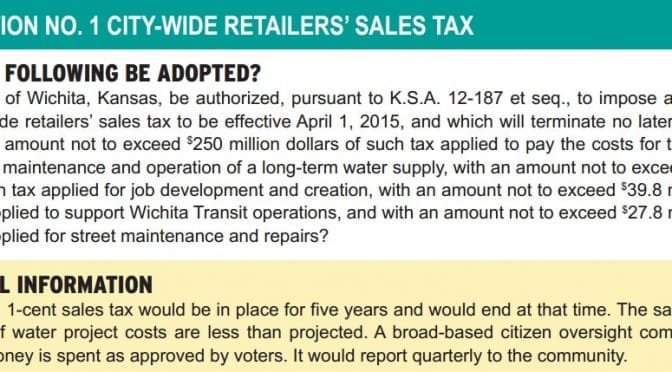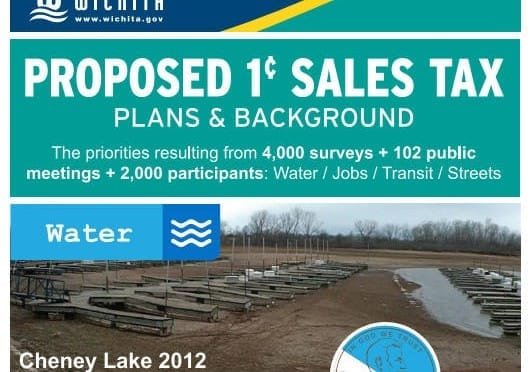Tag: Wichita Chamber of Commerce
-

‘Yes Wichita’ co-chairs serve up contradicting plans for sales tax revenue
At two forums on the proposed Wichita sales tax, leaders of the “Yes Wichita” group provided contradicting visions for plans for economic development spending, and for its oversight.
-

Another Wichita sales tax forum
On Wednesday October 29 KCTU Television held a televised debate on the issue of the proposed one cent per dollar Wichita sales tax.
-

Wichita sales tax forum
The League of Women Voters — Wichita Metro held a lunchtime forum on the issue of the proposed one cent per dollar Wichita sales tax.
-
In Wichita, the public deserves and should demand answers
From Kansas Senator Michael O’Donnell, a discussion of issues surrounding the proposed Wichita one cent per dollar sales tax. O’Donnell served on the Wichita City Council for nearly two years before resigning to serve in the senate.
-
Proposed Wichita sales tax won’t satisfy needs, appetites
The proposed Wichita sales tax does little to address the city’s delinquent infrastructure maintenance gap. Despite this, there are rumors of another sales tax next year for quality of life items.
-
To pay for a new Wichita water supply, are there other choices?
To pay for a new Wichita water supply, the city gives voters two choices. Either (a) vote for a sales tax, or (b) the city will issue long-term debt and the city will have to pay an additional $221 million in interest expense. Are there alternatives?
-
What is the purpose of a new Wichita water supply?
What is Wichita gaining with a new water supply? Is a new supply needed for basic uses such as household, commercial, and industrial?
-
Has the Wichita ASR system proven its worth in production?
I expressed my concerns regarding things I had recently learned, which is that we’ve cut expectations for ASR production in half. Also, ASR is still in commissioning stage.
-

Examining claims in favor of the proposed Wichita sales tax
The “Yes Wichita” group has made a series of statements regarding plans for a new water supply. It’s important that Wichita voters be aware of the complete facts and context of these claims so that they make an informed decision on how to vote.
-
Downtown Wichita campaigns for higher taxes on groceries and no taxes on downtown
Wichita Downtown Development Corporation campaigns for low-income households to pay more sales tax on groceries while it seeks tax breaks for downtown developers.
-
Wichita Chamber campaigns for higher taxes on those least able to pay
The Wichita Chamber campaigns for low-income households to pay more sales tax on groceries.
-
Misleading Wichita voters on water pipes
A television advertisement by the “Yes Wichita” group misleads Wichita voters in two ways, one which is significant.